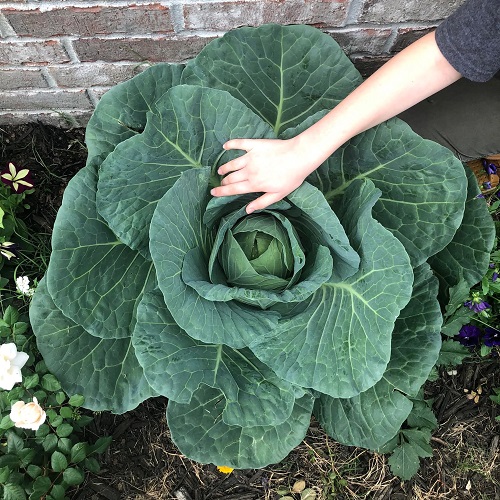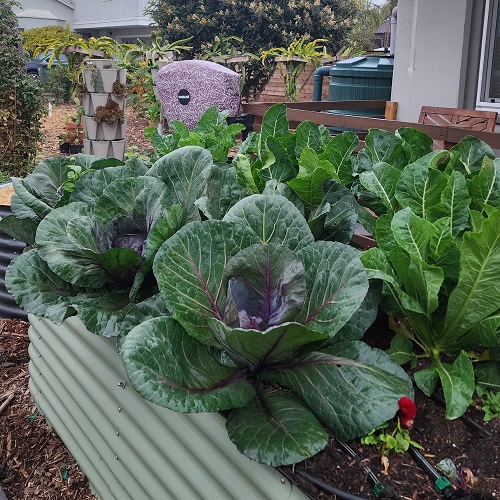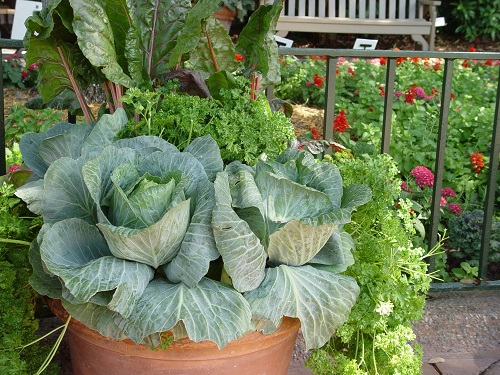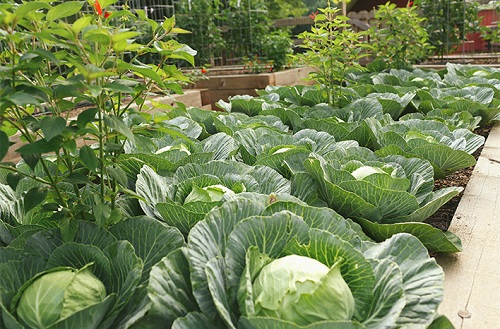Want to know How to Grow a Big and Giant Cabbage? This guide covers everything you need to know to cultivate a massive one!

Cabbages are a delicious and nutritious addition to any meal, and growing a massive one will not only fill the platter of everyone in the house but also give you an excuse to flaunt on Instagram. If you’re convinced by the idea–here’s all you need to know about Growing Giant Cabbages!
Read 8 Top Cabbage Growing Tips No One Will Tell You here
How to Grow Big and Gigantic Cabbage
1. Go For a Large Variety
To cultivate large cabbages, choose a variety that is renowned for producing sizeable heads.
One cabbage variety renowned for producing exceptionally large heads is the ‘Tropic Giant’ (Brassica oleracea var. capitata ‘Tropic Giant’).
Some other popular options are Megaton cabbage, Sugar Prince, Early Dutch, The Stone Head, and The Bobcat.
You can get their seeds easily from any garden center or search online.
2. Start The Seeds at the Perfect Time
If you are living in a cold climate, start the cabbage seeds indoors, providing the plants with additional time to mature. Whenever you start the seeds, to grow the biggest cabbage, it has to be perfect according to your local climate.
Use a well-draining potting mix, and choose a location that gets direct sunlight for at least 4-5 hours every day. Also, make sure the temperature stays in the ideal range for cabbage seedlings.
Before transplanting them in the garden or pot, gradually acclimate the seedlings to the outdoor temperature while still keeping them in the pots for over a week.
3. Choose a Sunniest Spot

For cabbages to flourish, they require a minimum of 6 hours of sunlight per day, but you’re growing the biggest cabbages, and for that, you need additional exposure, at least 8-9 hours, to develop large, well-formed heads.
Although cabbage plants can grow in partial shade, inadequate sunlight during the cool spring season can result in loose and small heads or prevent a massive head formation entirely.
4. Provide Adequate Space
There’s no rocket science behind the fact that a massive cabbage will need a large space to spread. Make sure there is at least 3 to 4 feet of space around the cabbage to expand.
This will give it enough room to grow and develop, helping it achieve the huge size you want!
5. Save it from the Cold

While mature cabbages can endure temperatures as low as 30 F (1 C), young and delicate seedlings require some additional attention.
To safeguard the plant, can either move it indoors until the weather warms up to at least about 54-60 F (12-15 C) during the day or start the seeds when you achieve this temperature in your area.
Find How to Grow Chinese Cabbage in Pots here
6. Fertilize it Correctly
Cabbage fertilizer should be high in nitrogen and phosphorus, which are both essential nutrients for healthy cabbage growth.
If you don’t find anything, use your balanced fertilizer with an NPK ratio of 10-10-10 or 20-20-20. Dilute it to 1/4 of its strength and use it once every 7-8 days. Watch the cabbage achieve an enormous size in no time!
Alternatively, you can also go for an 8-16-16 blend.
Note: Avoid fertilizers with too much nitrogen, as this can cause excessive leafy growth, which can lead to bolting.
7. Never Forget to Water

The best way to water cabbages is to use a soaker hose or a drip irrigation system. This type of bottom watering will ensure that the moisture is evenly distributed throughout the soil and that the roots get the water they need.
Aim to water the soil around the base of the cabbage and not the leaves directly, as this can cause fungal diseases. Water the soil until it is evenly moist, and check the soil moisture level regularly to ensure the soil is not drying out ever.
8. Keep an Eye on Bugs
One thing is clear–if you want to grow giant cabbages, your crop should be pest-free.
The presence of holes in the leaves is a clear indication that cabbage worms are feeding on your cabbage, gradually consuming it.
Check caterpillars beneath the leaves, where they often conceal themselves. Also, Cabbage looper, Diamondback moth, and Cross-Striped Cabbageworms can affect your cabbages.
- Keep the area around the cabbage free of weeds, as this will reduce the habitat for pests.
- Use row covers or other physical barriers to block pests from reaching the cabbage.
- Plant cabbage in rotation with other crops to reduce the chances of infestations.
- Remove and destroy any infested plants as soon as possible.
- Introduce beneficial insects such as ladybugs, which will help to control pests.
- Spray the cabbage plants with neem oil or insecticidal soap to reduce pest infestation.
9. Harvest at the Correct Time

Once the cabbage head feels solid to the touch, it’s time to harvest it. If the cabbage head feels loose and can be easily pressed in, it is an indication that it still needs more time to mature.
However, in the case of giant cabbages, it is always a good idea to wait a little bit more and a bit more to let them achieve a bigger size!
Learn How to Grow Cabbage in Pots here
10. Avoid Growing them in Small Pots
If you want to grow large cabbages, then avoid growing them in small pots, as it can restrict their growth. If you want to grow them in containers, choose a pot that’s at least 18-22 inches tall and wide.
Pro Tip: If you want to grow the biggest cabbage, always grow them on the ground!


